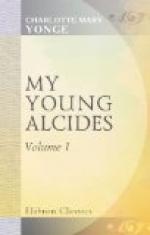Harold was off, and Lord Erymanth observed, “A very fine young man that. It is much to be regretted that he did not employ the advantages he enjoyed at Sydney as his cousin Eustace did, and left himself so rugged and unpolished.”
“You must learn to like him, dear Lord Erymanth,” I said. “He is all a very dear brother could be to me.”
And allegiance to him kept back every word of that infinite superiority, which was never more shown than by the opinion of Eustace, which his great unselfish devotion continued, without the least deceit, to impress on most people. Lord Erymanth rejoiced, and we agreed that it was very lucky for me that I preferred Harold, since I should have had to yield up my possession of Eustace. The old gentleman was most kind and genial, and much delighted that the old breach with the Alisons should be healed, and that his niece should make a marriage which he greatly preferred to her sister’s, and together we sung the praises of our dear Viola, where we had no difference of opinion.
Harold only came back when the carriage came round, and no sooner had we driven off than I broke out—“Harry, I had no notion matters had gone so far. Fancy, Lady Diana consulting her brother! It must be very near a crisis. I can’t think why you did not stay to see it.”
“Because I am a fool.”
The horse flew on till we were nearly out at the park-gates, and a bewildered sense of his meaning was coming before me. “You wished it,” said I rather foolishly.
“I did. I do. Only I don’t want to see it.”
“My poor dear Harold!”
“Pshaw!”—the sound was like a wild beast’s, and made the horse plunge—“I shall get over it.”
Then, presently, in a more natural voice, “I must go out again in the spring. There are things to be looked to at Boola Boola for both of us. I shall only wait till Tracy is well enough to go with me.”
“He! Dermot Tracy?”
“Yes. It will be the best way to break out of the old lines.”
“I can fancy that. Oh, Harold! are you going to save him? That will be the most blessed work of all!” I cried, for somehow a feeling like an air of hope and joy came over me.
“I don’t know about that,” said he, in a smothered tone; but it was getting dark enough to loose his tongue, and when I asked, “Was it his illness that made him wish it?” he answered, “It was coming before. Lucy, those horses have done worse for him than that wound in his shoulder. They had almost eaten the very heart out of him!”
“His substance I know they have,” I said; “but not his good warm heart.”
“You would say so if you saw the poor wretches on his property,” said Harold. “The hovels in the Alfy Valley were palaces compared with the cabins. Such misery I never saw. They say it is better since the famine. What must it have been then? And he thinking only how much his agent could squeeze from them!”




